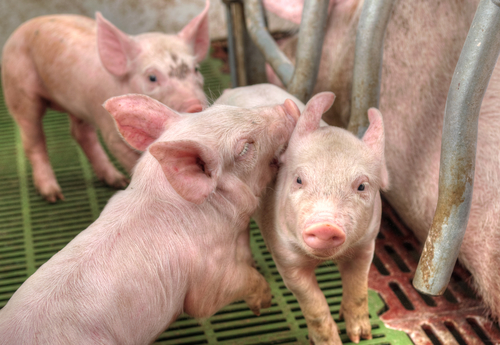Rejected piglets transported to slaughter in overcrowded lorries

Animal welfare organisations have slated the conditions facing hundreds of thousands of piglets when they are transported to southern European countries for slaughter.
Of the 22 million piglets that are born in the Netherlands each year, 2% to 4% have a medical condition, such as an umbilical hernia or abscesses, making them unsuitable for the Dutch meat industry.
The rejected piglets, aged between seven and 12 weeks, are then sent to countries such as Croatia, Spain and Italy where it is much cheaper to kill them
Animal welfare organisations Eyes on Animals and Animal Welfare Foundation AWF followed and secretly filmed two such transports to Croatia and say the companies are flouting the rules for the safe and humane transport of the piglets.
Some of the compartments in the trucks, each carrying up to a 1000 piglets, were overloaded, with pigs piled on top of each other, preventing them from getting to water. During one of the transports, the animals had no access to water at all for 18 hours and were not checked en route. Several piglets did not survive the journey.
“This is not a transport, this is survival,” Madelaine Looije, spokeswoman for Eyes on Animals, told Nieuwsuur. “We are talking about the most vulnerable animals in pig breeding.”
It is up to the food safety board NVWA to see to the proper treatment of the animals but vet Annebeth van Aartsen said the organisation does not have the capacity to check all shipments.
According to vet Kees Scheepens, the animals should be slaughtered in the Netherlands, despite the higher cost. “The meat can be frozen and exported. Why should profit always trump welfare?” he asked.
Nieuwsuur showed the footage of the transports to the chairman of pig breeders’ organisation POV for comment but was told the images showed “nothing out of the ordinary”. Individual pig breeders and transporters refused to comment. The NVWA is currently investigating the claims.
So far, nothing has come of measures to tackle live animal transports in Europe. Some 1.6 billion animals, including chickens, pigs and cows face journeys lasting days, often in extreme heat or cold.
European Union chair Denmark, itself a major meat exporter, has put forward a proposal to improve transport conditions but it is not expected to gain the backing of all member states, NOS said.
Thank you for donating to DutchNews.nl.
We could not provide the Dutch News service, and keep it free of charge, without the generous support of our readers. Your donations allow us to report on issues you tell us matter, and provide you with a summary of the most important Dutch news each day.
Make a donation